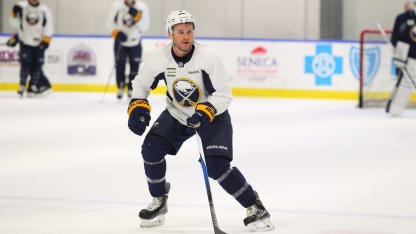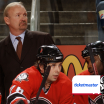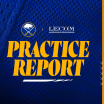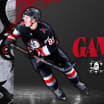"It went along with probably the worst year of my career," Franson said following practice on Friday. "When 6 became available, it was an easy choice."
That's a harsh self-evaluation for Franson, but it's easy to see where he's coming from. His first season in Buffalo started out fine, but eventually he was split between struggling to adapt to a new role and then trying to come back from an injury he knew little about.
Franson averaged over 18 minutes of ice time in each of the previous three seasons prior to joining the Sabres. He enjoyed those same minutes in the first few months of last season, skating over 20 minutes regularly into November. Once Zach Bogosian returned from injury, however, decisions had to be made.
"There was a battle for that power-play position and time and there was also a battle for ice time," Sabres coach Dan Bylsma said. "I think he started the season with a full complement, about 18 minutes and some power play time, and as guys came back, he moved into a different position on our team and I think that's kind of what happened."
Playing a lesser role proved to be a difficult adjustment.
"We changed personnel on the power play and some roles changed around," Franson said. "When Bogo came back, I had to adapt to a different role and I struggled with it last year, trying to play in that lower-minute range."
His season took a turn for the worse during a February game in Columbus, when he was hit hard into the boards from behind by Scott Hartnell. He didn't know it at the time, but his season was over. The only problem was that he didn't know exactly what was wrong with him.
Originally, he said, he was diagnosed with a concussion. But he was suspicious of that diagnosis because light wasn't bothering him; he could look into the sun and feel fine. What hurt him was quickly turning his head or changing direction, which would leave him feeling lightheaded.
As it turned out, Franson wasn't concussed at all. His ailment was vestibular, or a balance disorder, which was the product of his left eye tracking slower than his right.
"The scariest part about it was, it's not like a knee that you've sprained, an MCL or a shoulder," he said. "You can't just battle through some pain and feel your rehab process working. With this, it was a lot of tracking drills and stuff with eye goggles on, trying to work with deception and things like that."
While most rehab includes physical drills to get the body back in order, Franson spent his rehab tracking a tennis ball as it moved around him and completing other similar tracking drills. Eventually, visual therapy was able to provide him with statistical data that showed evidence of his improvement and helped ease his uncertainty.
Now, he's back and ready for a fresh start. Like his teammates, he's excited about the addition of Dmitry Kulikov to the defense and the left-right balance it will provide. He's also embracing the competition for minutes, which is evident in how he spent his summer.
"I'm taking camp very seriously, trying to reestablish myself in this lineup and make it tough for the coaches to not play me," he said.
It's only one day, but his coach has already taken notice of the work he put in.
"I don't know if you can see it but he came back with a little bit different body composition," Bylsma said. "He's a little leaner, I think he's moving better, and that's a result of the summer he had and it's got to translate into his play on the ice."



















